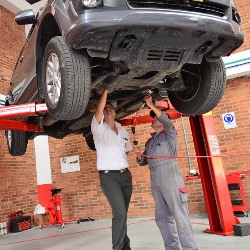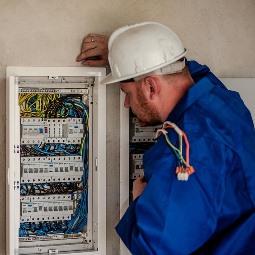How to Find the Right Vocational School Program near Filer Idaho
 Deciding to work in a new profession and enroll in a trade school near Filer ID are important decisions that will profoundly impact your long term career. But with so many vocational schools to select from, just how do you undertake identifying the ideal one? Not only do you have to make certain that you will get the extensive training necessary to be successful in your new field, but also that the school is highly regarded and reputable. Some potential students make the mistake of selecting a trade school just because the campus is closest to their residence or where the work. Or they may gravitate to the one that charges the lowest tuition. Of course the cost and location of the training are significant considerations when assessing vocational school options, but they should not be the sole ones. Other factors such as reputation and accreditation of the schools are important as well. So prior to beginning your evaluations and comparing trade schools, you will need to know what questions to ask in order to get the information to make a final choice. We will review some of those questions later in this post. But to start with, let’s look at some of the vocation options that are available as well as the availability of online schools.
Deciding to work in a new profession and enroll in a trade school near Filer ID are important decisions that will profoundly impact your long term career. But with so many vocational schools to select from, just how do you undertake identifying the ideal one? Not only do you have to make certain that you will get the extensive training necessary to be successful in your new field, but also that the school is highly regarded and reputable. Some potential students make the mistake of selecting a trade school just because the campus is closest to their residence or where the work. Or they may gravitate to the one that charges the lowest tuition. Of course the cost and location of the training are significant considerations when assessing vocational school options, but they should not be the sole ones. Other factors such as reputation and accreditation of the schools are important as well. So prior to beginning your evaluations and comparing trade schools, you will need to know what questions to ask in order to get the information to make a final choice. We will review some of those questions later in this post. But to start with, let’s look at some of the vocation options that are available as well as the availability of online schools.
Vocational School Training Options near Filer ID
 There are a number of professions to choose from in vocational schools that provide fulfilling and good paying careers. Maybe you have already chosen one that you have for years desired to pursue. For example, maybe you have always had fun working on your car and have considered utilizing that talent to make a living as a car mechanic. Or perhaps a family member has had a prosperous career in a certain trade or vocation and you would love to follow in his or her footsteps. Regardless of what your motivation is for going into a trade, there is likely a program offered that will give you the training that you need. Below is just a small representation of the trade school programs that are offered in the Filer ID area.
There are a number of professions to choose from in vocational schools that provide fulfilling and good paying careers. Maybe you have already chosen one that you have for years desired to pursue. For example, maybe you have always had fun working on your car and have considered utilizing that talent to make a living as a car mechanic. Or perhaps a family member has had a prosperous career in a certain trade or vocation and you would love to follow in his or her footsteps. Regardless of what your motivation is for going into a trade, there is likely a program offered that will give you the training that you need. Below is just a small representation of the trade school programs that are offered in the Filer ID area.
- Auto Mechanic
- Heating And Air Conditioning (HVAC) Tech
- Plumber
- Electrician
- Welder
- Truck Driving
- Aircraft Maintenance Tech
- Lab Technician
- Construction Manager
Each of the programs will have differing completion times and costs depending on the vocation, credential earned and school. Many of the programs may be completed in just weeks, while others will call for several months or even two or more years of instruction. All of these variables need to be taken into account prior to selecting a trade and a school.
Click Here to Get Free Information on Trade Schools Near You!
Trade Schools Online
 Schools available online have become very popular with Filer ID students and a growing number of accredited programs are becoming available. Even though online learning is a readily available and practical way to earn a degree or certificate, it may not be the ideal option for all trades or vocations. For instance, learning to drive a semi truck is not something that you can do online, nor is learning how to weld. These are skills that have to be acquired through practical training and by doing it, not by reading about it or watching videos. But certain elements of the training may be appropriate for online training, for example learning driving and safety regulations for truck driving schools or studying metallurgy or how to read blueprints for welder schools. Many programs will blend online education with on-campus lab work, such as for HVAC or plumbing schools. So it is crucial to determine before enrolling in an online school for any trade if there is an adequate amount of hands-on training allocated to the course of study. One means to help ensure that a trade school program is both suitable for online studying and delivers in-depth practical training is to verify that it’s accredited by a nationally acknowledged accrediting agency (more on accreditation later). For those trades that are suitable for online training, it can be a convenient way for those with limited time to learn a new trade.
Schools available online have become very popular with Filer ID students and a growing number of accredited programs are becoming available. Even though online learning is a readily available and practical way to earn a degree or certificate, it may not be the ideal option for all trades or vocations. For instance, learning to drive a semi truck is not something that you can do online, nor is learning how to weld. These are skills that have to be acquired through practical training and by doing it, not by reading about it or watching videos. But certain elements of the training may be appropriate for online training, for example learning driving and safety regulations for truck driving schools or studying metallurgy or how to read blueprints for welder schools. Many programs will blend online education with on-campus lab work, such as for HVAC or plumbing schools. So it is crucial to determine before enrolling in an online school for any trade if there is an adequate amount of hands-on training allocated to the course of study. One means to help ensure that a trade school program is both suitable for online studying and delivers in-depth practical training is to verify that it’s accredited by a nationally acknowledged accrediting agency (more on accreditation later). For those trades that are suitable for online training, it can be a convenient way for those with limited time to learn a new trade.
Questions to Ask Trade School Programs
 After you have chosen the vocation and type of certificate or degree that you wish to earn, either on campus or online, you can start to decrease your selection of schools. As you are certainly aware, there are numerous trade schools in the Filer ID area and throughout the Country to choose from. That’s why it is imperative to have a list of relevant qualifiers when making school comparisons. As earlier stated in our opening paragraph, tuition and location will probably be the first two aspects you will look at. Following are several additional ones that you will want to research before enrolling in your school of choice.
After you have chosen the vocation and type of certificate or degree that you wish to earn, either on campus or online, you can start to decrease your selection of schools. As you are certainly aware, there are numerous trade schools in the Filer ID area and throughout the Country to choose from. That’s why it is imperative to have a list of relevant qualifiers when making school comparisons. As earlier stated in our opening paragraph, tuition and location will probably be the first two aspects you will look at. Following are several additional ones that you will want to research before enrolling in your school of choice.
Accreditation. Numerous Filer ID area vocational schools have acquired either a regional or a national accreditation. They may attain Institutional Accreditation, which involves the school’s programs as a whole, or Programmatic Accreditation, which relates to an individual program, for instance HVAC technology. Verify that the school and program are accredited by a U.S. Department of Education recognized accrediting organization, which includes the Accreditation Board for Engineering and Technology. Along with helping make certain that you obtain a superior education, it may help in acquiring financial aid or student loans, which are in many cases not available for non-accredited schools. Also, many states require that the training course be accredited in order to be approved for licensing where applicable.
How Long in Operation? One clue to help measure the quality of a trade school near Filer ID is how long it has been in business. A negatively ranked or a fly by night school normally will not be in business very long, so longevity is a big plus. However, even the top schools had to start from their opening day of training, so consider it as one of multiple qualifications.
Completion Rates. Ask the trade schools you are reviewing what their completion rates are. The completion rate is the percentage or portion of students who enroll in and finish the program. A lower completion rate could signify that students were disappointed with the program and quit. It might also mean that the instructors were not qualified to train the students. It’s similarly essential that the schools have high job placement rates. Older and/or more reputable schools may have a more extensive list of graduates, which may result in more contacts for the school to utilize for their apprenticeship and job placement programs. A high job placement rate can not only confirm that the school has an excellent reputation within the trade, but also that it has the network of contacts to help graduates acquire apprenticeships or employment in the Filer ID area.
Apprenticeship Programs. Numerous training programs are taught in conjunction with an internship or an apprenticeship program. Those participating trade and vocational programs will help place you in an apprenticeship program within their network of companies or trade unions. Find out if the schools you are comparing have referring partnerships with Filer ID area specialists in the trade. An apprenticeship not only offers a valuable experience by supplying practical training, but it also furnishes employment opportunities and helps to build relationships in the local professional community.
Modern Facilities. Make sure that the campus facilities and the tools that you will be trained on are state-of-the-art and what you will be using on the job. If you are already in an internship or an apprenticeship, consult with the technician you are working under regarding what you should be expecting. Otherwise, ask a local Filer ID contracting company if they can give you some pointers. Also keep in mind that unless you can move, the school needs to be within driving distance of your home. Remember that if you decide to enroll in an out-of-state school, in addition to moving costs there may be increased tuition fees compared to in-state residents.
Smaller Classes. It’s important that you receive as much personalized instruction as possible, which can be challenging in larger classes. Ask if you can sit in on some of the classes so that you can see how big they are and witness first hand the interaction between teachers and students. Speak with a few of the students and get their opinions regarding class sizes and instruction. Last, talk to some of the instructors and find out what their level of experience is in Idaho and what certifications or degrees they have earned.
Flexible Scheduling. Confirm that the class schedules for the programs you are reviewing are flexible enough to fulfill your needs. If you are only able to go to classes in the evening or on weekends near Filer ID, confirm that the programs you are comparing offer those options. If you can only attend part-time, be sure that the school you select permits part-time enrollment. Also, ask what the protocol is to make-up classes should you miss any because of work, illness or family responsibilities.
Career Training Programs Near Me Filer Idaho
 Choosing the right trade school near Filer ID is an important first step toward a gratifying career in the vocation of your choice. As we have discussed in this post, you need to select a technical school and a certificate or degree program that are both accredited and have outstanding reputations within the field. Other features to look for are sufficient practical training and modern facilities. You should visit each of the schools in person that you are most interested in to tour the campus and speak with both the faculty and current students. Try to get a feel for the quality of the teaching and the interaction between them. Also, ask about scheduling choices and whether night or weekend classes are offered if needed. And remember to ask about financial aid and student loan options also. You initially came to this website because of your interest in Career Training Programs Near Me and wanting more information on the topic Best Trade School Programs. However, if you ask the appropriate questions as we have detailed in our checklist for evaluating schools, you’ll be able to filter your options so that you can make an educated decision. With the appropriate training, hard work and dedication, you can ultimately become a licensed professional in your chosen trade.
Choosing the right trade school near Filer ID is an important first step toward a gratifying career in the vocation of your choice. As we have discussed in this post, you need to select a technical school and a certificate or degree program that are both accredited and have outstanding reputations within the field. Other features to look for are sufficient practical training and modern facilities. You should visit each of the schools in person that you are most interested in to tour the campus and speak with both the faculty and current students. Try to get a feel for the quality of the teaching and the interaction between them. Also, ask about scheduling choices and whether night or weekend classes are offered if needed. And remember to ask about financial aid and student loan options also. You initially came to this website because of your interest in Career Training Programs Near Me and wanting more information on the topic Best Trade School Programs. However, if you ask the appropriate questions as we have detailed in our checklist for evaluating schools, you’ll be able to filter your options so that you can make an educated decision. With the appropriate training, hard work and dedication, you can ultimately become a licensed professional in your chosen trade.
Other Idaho Hard Working Locations
Filer, Idaho
It was named after Walter G. Filer, who served as general manager of the Twin Falls Water and Land Company. The city was established in 1906 as the terminus of the Oregon Short Line branch of Twin Falls. Walter Filer was a mining engineer and surveyor from Sharon, Pennsylvania, who supervised the construction of the Milner diversion dam on the Snake River. Since 1916, the City of Filer has been the home of the Twin Falls County Fair and Rodeo (Magic Valley Stampede).
As of the census[2] of 2010, there were 2,508 people, 951 households, and 653 families residing in the city. The population density was 2,366.0 inhabitants per square mile (913.5/km2). There were 1,002 housing units at an average density of 945.3 per square mile (365.0/km2). The racial makeup of the city was 91.6% White, 0.1% African American, 1.0% Native American, 0.1% Asian, 4.3% from other races, and 2.9% from two or more races. Hispanic or Latino of any race were 11.7% of the population.
There were 951 households of which 38.9% had children under the age of 18 living with them, 51.6% were married couples living together, 12.7% had a female householder with no husband present, 4.3% had a male householder with no wife present, and 31.3% were non-families. 27.7% of all households were made up of individuals and 10.8% had someone living alone who was 65 years of age or older. The average household size was 2.64 and the average family size was 3.23.
